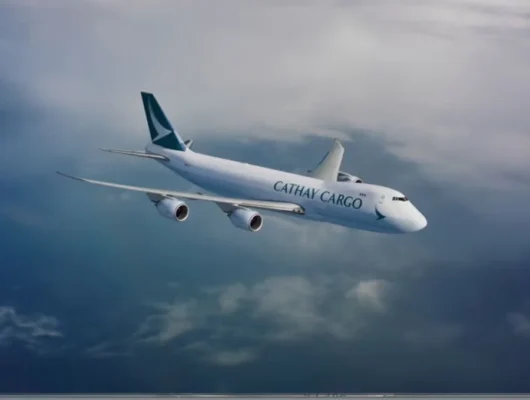
Cathay Pacific and Singapore Airlines sign a sustainability agreement they hope will boost sustainable aviation fuel use and their journey towards net zero
Cathay and Singapore Airlines (SIA) have signed a memorandum of understanding (MoU) that will see them work together on sustainability projects.
The agreement was signed by Cathay Group CEO Ronald Lam and Singapore Airlines CEO Goh Choon Phong in Dubai, at the 80th International Air Transport Association (IATA) AGM and World Air Transport Summit.
It commits the two airlines to collaborate on and advocate for the development and use of sustainable aviation fuel (SAF) in the Asia-Pacific region.
According to a joint press release, the agreement “underscores both carriers’ commitment to achieving net zero carbon emissions by 2050 and affirms their aspiration to help drive sustainability changes in the airline industry”.
It focuses on two areas.
Sustainable Aviation Fuel
Firstly, Cathay and SIA will jointly advocate for the greater use of SAF in the Asia-Pacific region.
The press release says this will include:
- Raising public awareness about SAF’s critical role in decarbonising aviation
- Advocating for supportive policies in the region
- Promoting the creation of a standard global accounting and reporting framework to ensure the transparency and verifiability of emission reductions from the use of the fuel.
The release says: “The airlines will also explore potential opportunities for joint procurement of SAF at selected locations.
“These are aimed at boosting SAF production and supporting its wider adoption in the airline industry.”
Ground and cargo waste
The second area of focus will be the exchange of best practices to reduce single-use plastics, minimise waste and improve energy efficiency in ground and cargo operations.
The airlines said: “This will allow Cathay and SIA to improve their sustainability performance and speed up the development and implementation of sustainable solutions in their operations.”
Ronald said: “As part of our collaborative ethos of ‘Greener Together’, we actively seek like-minded industry leaders for strategic partnerships in transitioning to sustainable aviation.
“Our collaboration with Singapore Airlines aims to accelerate and support the development of the SAF supply chain in the region, fostering a reliable SAF ecosystem to enable the industry to achieve its long-term decarbonisation goals.”
He added: “Cathay was one of the first airlines in Asia to set a target of 10% SAF for its total fuel consumption by 2030 and we are undertaking a multi-pronged approach to contribute to the aviation industry’s transition towards a greener future.”
Goh Choon said: “Singapore Airlines is committed to embedding sustainability in all aspects of our operations. At the same time, we recognise that we cannot achieve our targets alone.
“Our partnership with Cathay signifies our mutual ambition to enhance collaboration in sustainability initiatives in the Asia-Pacific region.
“Together we are helping to set the foundation for a more sustainable aviation industry, and ensure that future generations continue to reap the benefits of air travel.”
What is Sustainable Aviation Fuel?
SAF is an alternative fuel made from non-petroleum feedstocks that is designed to reduce carbon emissions from air transportation. It is seen as a critica sustainability lever for the industry.
It can be blended with traditional fuels at different levels, with limits between 10% and 50%, depending on the feedstock and how the fuel is produced.
Worldwide, aviation accounts for 2% of all carbon dioxide (CO2) emissions and 12% of all CO2 emissions from transportation.
According to the International Civil Aviation Organization (ICAO), over 360,000 commercial flights have used SAF at 46 different airports largely concentrated in the United States and Europe.
But it remains a long distance from being transformational: despite its production doubling to 600 million litres in 2023, it represents 0.2% of global jet fuel use.
Source: Click to Visit Source